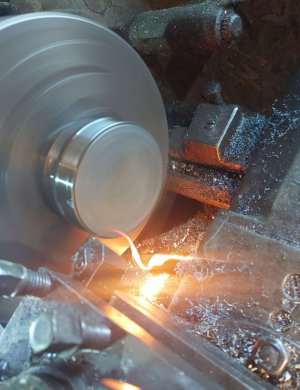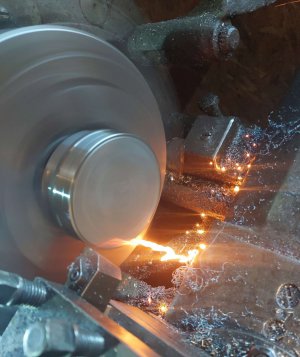Well, I had a little fire in my "big" lathe's chip pan today and I was glad I always keep a CO2 fire extinguisher handy in the shop when doing anything that results in glowing hot metal like using CBN inserts or grinding.
I had some thin aluminum ribbons from drilling large holes in aluminium in the pan and the glowing yellow CBN chips set them alight. I always thought only magnesium does that, but clearly, aluminium is a hazard too.
For those that haven't seen CBN chips here are two photos I took that do them justice. They are as hot as they look like. To set aluminium alight they must be pretty hot.


So I thought I'll share this useful tip with everyone here
Why CO2 and not, let's say powder, or water fire extinguisher? I prefer CO2 because I was told it is the preferred fire extinguisher to use for burning metals, oils and fuel fires. It also works great on electrical fires. Powder is usually recommended as better for electricals but although indeed better at putting out electrical fires it also absolutely destroys electronics. One doesn't want to extinguish a small fire in one part of a shop and loose lots of valuable equipment like welders etc just because powder got into them and corroded the insides. Therefore CO2 is my preferred fire extinguisher type for a metalworking workshop period. If you also work with wood, a water extinguisher is handy too (just for wood/paper). Another benefit of CO2 is that you can control the stream od CO2 quite well in big extinguishers. You can also use it multiple times.
I had some thin aluminum ribbons from drilling large holes in aluminium in the pan and the glowing yellow CBN chips set them alight. I always thought only magnesium does that, but clearly, aluminium is a hazard too.
For those that haven't seen CBN chips here are two photos I took that do them justice. They are as hot as they look like. To set aluminium alight they must be pretty hot.


So I thought I'll share this useful tip with everyone here
Why CO2 and not, let's say powder, or water fire extinguisher? I prefer CO2 because I was told it is the preferred fire extinguisher to use for burning metals, oils and fuel fires. It also works great on electrical fires. Powder is usually recommended as better for electricals but although indeed better at putting out electrical fires it also absolutely destroys electronics. One doesn't want to extinguish a small fire in one part of a shop and loose lots of valuable equipment like welders etc just because powder got into them and corroded the insides. Therefore CO2 is my preferred fire extinguisher type for a metalworking workshop period. If you also work with wood, a water extinguisher is handy too (just for wood/paper). Another benefit of CO2 is that you can control the stream od CO2 quite well in big extinguishers. You can also use it multiple times.

